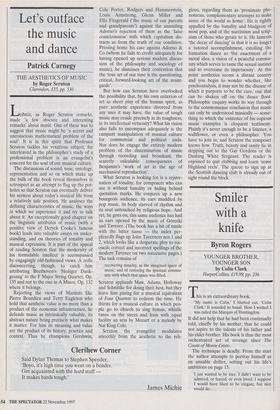Let's outface the music and dance
Patrick Carnegy
THE AESTHETICS OF MUSIC by Roger Scruton Clarendon, f35, pp. 530 Leibniz, as Roger Scruton remarks, made 'a few obscure and interesting remarks' about music. One of these was to suggest that music might be 'a secret and unconscious mathematical problem of the soul'. It is in this spirit that Professor Scruton tackles his vexatious subject, for interleaved in the philosopher's study of a professional problem is an evangelist's concern for the soul of our musical culture.
The discussions of sound, tone, ontology, representation and so on which make up the bulk of the book reveal themselves in retrospect as an attempt to flag up the pot- holes so that Scruton can eventually deliver his sermon about today's musical life from a relatively safe position. He analyses the defining characteristics of music, the ways in which we experience it and try to talk about it. An exceptionally good chapter on the linguistic attributes of music (with a positive view of Deryck Cooke's famous book) leads into valuable essays on under- standing, and on theories of tonality and musical expression. It is part of the appeal of reading Scruton that the modernity of his formidable intellect is accompanied by engagingly old-fashioned views. A trifle disconcerting, though, to catch him attributing Beethoven's lleiliger Dank- gesang' to the F Major String Quartet, Op. 135 and not to the one in A Minor, Op. 132 where it belongs.
Rejecting the views of Marxists like Pierre Bourdieu and Terry Eagleton who hold that aesthetic value is no more than a product of the economic infrastructure, he defends music as intrinsically valuable, its abstract nature being precisely what makes it matter. For him its meaning and value are the product of its history, practice and context. Thus he champions Gershwin, Cole Porter, Rodgers and Hammerstein, Louis Armstrong, Glenn Miller and Ella Fitzgerald (`the music of our parents and grandparents') against the unsmiling Adorno's rejection of them as the 'false consciousness' with which capitalism dis- tracts us from the truth of our condition. Pressing home his case against Adorno & Co (whom he fails to credit adequately for having opened up serious modern discus- sion of the philosophy and sociology of music), he dismisses their contention that the 'true art of our time is the questioning, critical, forward-looking art of the avant- garde'.
But how can Scruton have overlooked the possibility that, by his own criterion of art as sheer play of the human spirit, as pure aesthetic experience divorced from any uses it may have, the value of tough music may reside precisely in its toughness, in its intellectual virtuosity? What his vision also fails to encompass adequately is the rampant manipulation of musical culture for commercial and political ends. Nor does he engage the entirely modem problem of the dissemination of music through recording and broadcast, the scarcely calculable consequences of Benjamin's 'work of art in the age of mechanical reproduction'.
What Scruton is looking for is a rejuve- nation of tonality, for composers who can use it without banality or hiding behind quotation marks. He conjures up a new bourgeois audience, its ears muddied by pop music, its body starved of rhythm and its soul untouched by religious hope. And yet, he goes on, this same audience has had its ears opened by the music of GOrecki and Tavener. (The book has a bit of tussle with the latter name — the index per- plexedly flags up John Taverners nos 1 and 2, which looks like a desperate ploy to rec- oncile correct and incorrect spellings of the modern Tavener on two successive pages.) The task remains of
recovering tonality, as the imagined space of music, and of restoring the spiritual commu- nity with which that space was filled.
Scruton applauds Maw, Adams, Holloway and Schnittke for doing their best, but they leave him pining for a musical equivalent of Four Quartets to redeem the time. He thirsts for a musical culture in which peo- ple go to church to sing hymns, whistle tunes on the street and hum with equal facility an aria by Mozart or a melody by Nat King Cole.
Scruton the evangelist modulates smoothly from the aesthetic to the reli- gious, regarding them as 'proximate phe- nomena, complementary attempts to make sense of the world as home'. He is rightly appalled by the banality and bludgeon of most pop, and of the narcissism and solip- sism of those who gyrate to it. He laments `the decay of dancing' in that it is no longer a tutored accomplishment, extolling the formation dance as 'the enactment of a moral idea, a vision of a peaceful commu- nity which serves to tame the sexual instinct and to overcome its impetuosity'. At this point aesthetics seems a distant country and you begin to wonder whether, like psychoanalysis, it may not be the disease of which it purports to be the cure, one that can be shaken off on the dance floor. Philosophic enquiry works its way through to the commonsense conclusion that music can only be understood musically — some- thing to which the existence of his copious music examples is eloquent testimony. Plainly it's never enough to be a listener, a wallflower, or even a philosopher. You have to join in, and Scruton the composer knows how. Truth, beauty and sanity lie in stepping out to the Gay Gordons or the Dashing White Sergeant. The reader is enjoined to quit clubbing and learn 'some Highland reels'. The queue to sign up at the Scottish dancing club is already out of sight round the block.


















































































 Previous page
Previous page